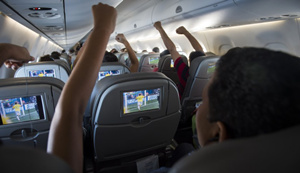(单词翻译:单击)

During the World Cup games, many of us broke away from the workday to catch the emotional matches. At my office, like at many other companies large and small, we played the games’ live streams from the ESPN app on a big projector. Sure enough, the lag has been bad, as demand has swamped the servers. WatchESPN was outright crashing during theU.S.-Germany game last month.
世界杯期间,我们中的许多人都在工作日抽身去看那些令人激动的比赛。和许多大大小小的公司一样,我们公司也用大投影仪通过ESPN客户端来收看实况转播。延迟很厉害,这是一定的,原因是需求让服务器不堪重负。上个月美德大战时,ESPN的服务器干脆崩溃了。
I’m guessing nobody is really surprised, given, as some might recall, the Oscars livestream crashed; HBO Go fizzled during the True Detective finale and Veronica Mars movie backers couldn’t get their free digital downloads on time.
我猜没有人真的感到意外,因为可能还有人记得,奥斯卡颁奖典礼的网络直播就崩溃过;《真探》(True Detective)大结局时,HBO的客户端也不能正常使用;《美眉校探》(Veronica Mars)电影版的拥趸同样无法顺利进行免费下载。
We’re used to these delays. The Internet literally can’t handle the amount of TV we watch; the idea behind “TV everywhere,” where television broadcasters provide viewers with access to online content via live or on-demand, may be impossible with our current infrastructure.
我们对这样的延迟已经习以为常。互联网确实处理不了我们观看的大量电视节目;“电视无处不在”的意思是电视台以直播或点播的方式向观众提供在线内容,但现在的基础设施可能无法实现这样的想法。
Netflix NFLX -1.00% takes up about 30% of home Internet bandwidth in North America, and data from Procera estimates that anywhere from 6% to 10% of the online streaming service’s subscribers watched at least one episode of House of Cards Season 2 in its first weekend. Yet House of Cards doesn’t have nearly as many viewers as a moderately successful TV show. A total of 4.6 million people watched the premiere of USA’s Suits, for example, which for a series, is an impressive but not gargantuan hit (but one of my personal favorites!). And that’s not even broadcast, it’s cable. A highly anticipated episode of How I Met Your Mother could pull in close to 11 million viewers.Given such viewership, it seems the Internet literally cannot handle television.
奈飞(Netflix)占据了北美约30%的家用互联网带宽。网络数据统计机构Procera估算,《纸牌屋》(House of Cards)第二季播出的首个周末,6%-10%的奈飞用户至少观看了一集。不过,这样的观众规模还赶不上一般成功的电视节目。比如说,美国电视网(USA Network)的《金装律师》(Suits)首次播出时的观众人数为460万。这样的观众规模对一部电视连续剧来说已经很可观,但还算不上火爆异常(不过这是我最喜欢的电视剧之一)。此外,这部电视剧甚至没有以无线形式播出,只是进入了有线电视网络。《老爸老妈的浪漫史》(How I Met Your Mother)中备受期待的一集可以引来近1100万观众。考虑到这样的收视规模,互联网似乎真的没办法承载电视。
Because it takes up that whopping 30% of home Internet bandwidth, Netflix is disrupting traditional “peering” structures whereby two or more networks, which are required to be connected at a hardware level, exchange traffic for free. The networks that Netflix connects to are sending significantly more traffic to their peering partners than they’re receiving in return. The extra traffic forces many of these last-mile providers to either spend money to upgrade their infrastructure, or their users will suffer from a degraded viewing experience.
由于掌握了高达30%的家用互联网带宽,奈飞打破了传统的对等直联结构,也就是两个或多个网络在硬件层面连接在一起,免费交换数据。奈飞连接的网络向对等网络发送的数据远远超过了从对方那里接收的数据。这些多出来的数据迫使许多这样的“最后一哩”服务供应商升级自己的基础设施,否则,用户的收视体验就会打折。
Earlier this year, Comcast CMCSA -0.69% and Netflix signed a paid peering agreement designed to improve Netflix’s performance, but that doesn’t change the fact that we are consistently at the limits of bandwidth when it comes to streaming high-quality video. Sure enough, a few months later, images of Netflix error messages blaming Verizon for slow bandwidth started going viral online.
今年早些时候,康卡斯特(Comcast)和奈飞签署了一份付费直联协议,旨在改善奈飞的节目播出效果,但这个举措并不能改变这样一个事实。那就是,播放高质量视频时我们对带宽的使用总是处于极限状态。可以肯定,几个月后奈飞指责威瑞森(Verizon)影响网速的报错信息截图就会像病毒一样在网上传播开来。
I binge-watched the latest season of House of Cards.Even though my wife and I pay for an upgraded Verizon FiOS Internet package, every episode came through in painfully grainy quality. Every now and then, when the scenery barely moved, it would snap into much better focus, only to remind me how bad the viewing quality was. Obviously, as we later learned, the issue wasn’t Verizon to my house, but Netflix to Verizon.
我一集不落地看了《纸牌屋》的最新一季。尽管我和我妻子购买了威瑞森的FiOS套餐升级版,每集的画质依然惨不忍睹。时不时地,每次画面基本定格的时候,清晰度就会明显上升,这只能让我想到画面质量究竟有多糟糕。就像我们后来了解到的那样,问题显然不是出在威瑞森到我们家这个环节,而是奈飞到威瑞森。
The problem is potentially bigger: Cord-cutters like to talk about being free of the constraints of cable bundles, but the trend I’m seeing is that bandwidth deals could turn into bundles themselves. Imagine you move into a new neighborhood and have a choice of Internet service providers; before you select, you need to do some homework on who has deals in place with the video content companies you like to watch over the Internet.
问题可能会变得更严重:拒绝有线电视的人喜欢把摆脱有线电视套餐的束缚挂在嘴边,但我看到的趋势是,网络视频服务本身也可能以套餐形式出现。想象一下,你搬了家,可以在一些网络服务供应商之间进行选择;那么在你做出决定之前,你需要先考察一下,看看哪些网络公司可以提供你喜欢在线观看的视频内容。
We truly want “TV everywhere.” Yet when most people talk about problems with Netflix and its ilk, they’re talking about concerns that their subscription rates are going to go up or that some studio is going to pull their favorite movies from on-demand streaming. With theAereo U.S. Supreme Court decision, cord-cutters are now quickly hunting down their next best options. But as long as these bandwidth problems are as glaring as they are (and getting worse) we’re not going to make the strides we need, and the industry won’t be able to deliver the experience that consumers are hungry for. And judging by the fact that Netflix more than doubled its Emmy nomination haul this year, I’d wager they (we) are pretty hungry.
我们当然希望“电视无处不在”。然而,许多人谈到奈飞等公司的问题时担心的事情是收费上升,或者某些电影公司把他们最喜欢的电影撤出点播清单。随着美国最高法院裁定网络电视公司Aereo侵犯电视台版权,拒绝有线电视的消费者现在开始迅速寻找次优方案。但只要这些带宽问题一直这么突出(或者变得更糟),我们就没办法大步向前迈进,这个行业也就没办法为消费者提供他们渴望的那种体验。奈飞今年获得的艾美奖提名增加了一倍以上,我得说他们(也包括我们)的期待程度相当高。


